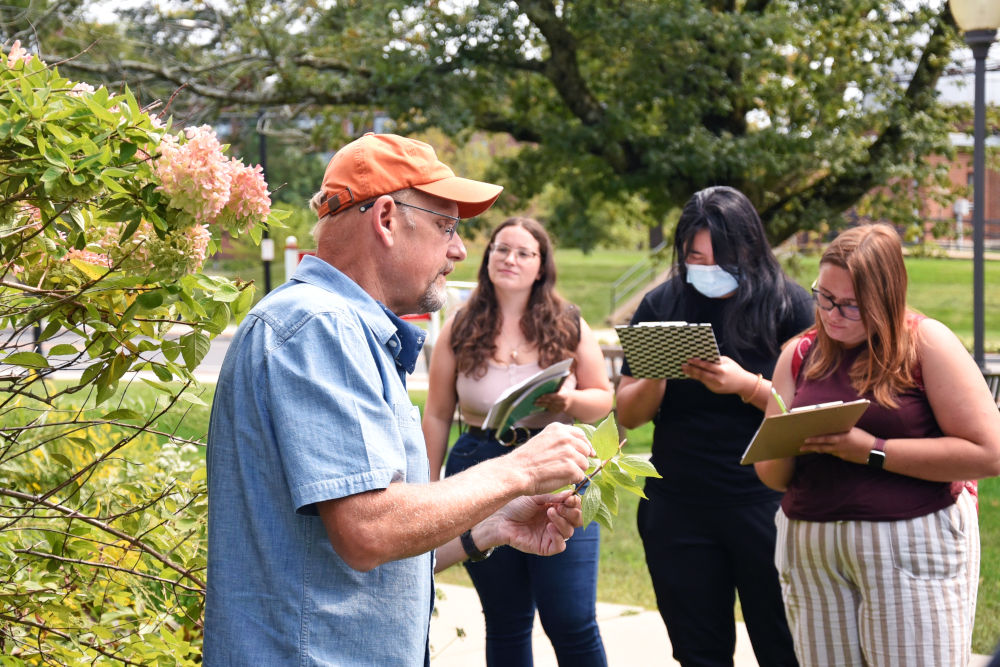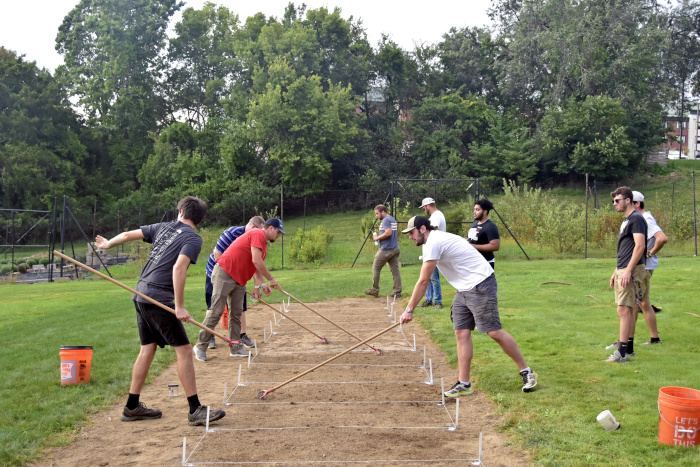- BIOL 1108 or 1110; CHEM 1122 or 1124Q or 1127Q; PLSC 1120, 2120, 2125, 2110W or 3660W, and 4210.
- The writing in the major requirement is satisfied by PLSC 2110W or 2560W.
Concentrations Requirements:
- Environmental Horticulture:
- PLSC 3640;
- Two of the following: PLSC 3810, 3820, 3830;
- Two of the following: PLSC 2430, 3410, 3560;
- Three of the following: PLSC 3440, 3540, 3550, 3610, 3660, 3670, 4650;
- Sustainable Agriculture:
- PLSC 2100, 2500, 3610, 3620, 3840, 3990;
- Two of the following: PLSC 3810, 3820, 3830
- Turfgrass Science:
- PLSC 1100, 1115, 3150, 3620, 3990;
- Three of the following: PLSC 3810, 3820, 3830, 3840;
- One of the following:PLSC 2430, 3410, 3550.
Students successfully completing these courses will have met their general education exit requirements for information literacy.
A student's official Plan of Study/Academic Requirements is located in StudentAdmin.

Mark Brand of the Department of Plant Science and Landscape Architecture takes students around the Storrs campus as part of the class Woody Plants: Common Trees, Shrubs and Vines (PLSC 3410).

Students in a lecture on soil production at the Floriculture Building.

Students rake and treat soil behind the Floriculture Greenhouse as part of the class Turfgrass Management (PLSC 1100).
Sample Sequences
Sample sequences of courses are available for each concentration and are for advising purposes only. Students do not have to follow these sequences exactly. The exact sequence of courses will vary for each student depending on previous coursework, academic preparation, and career goal.
Environmental Horticulture Sample Sequence of Courses
Sample Sequence of Courses PDF
UConn Graduation Requirements are found at catalog.uconn.edu - these include major and general education requirements (Content Areas: 1, 2, 3, and 4, Writing, Quantitative, **Foreign Language and Environmental Literacy).
Students normally average 15 credits per semester over a 4-year period (fall/spring only) to meet the 120 academic credits required.
First Year
| Fall Semester
PLSC 1120 Introduction to Plant Science (4 credits) BIOL 1108 Principles of Biology II or BIOL 1110 Introduction to Botany (4 credits) Elective (3 credits) ENGL 1007 or 1010 or 1011 (4 credits) UNIV 1800/1810 (FYE) (1 credit) Total: 16 credits |
Spring Semester
PLSC 2430 Herbaceous Ornamental Plants (3 credits) Elective (3 credits) CHEM 1122 or 1124Q or 1127Q* (4 credits) MATH 1020Q or higher (3 credits) Elective (3 credits) Total: 16 credits |
Second Year
| Fall Semester
PLSC 2110W Sustainable Plant Pest Management Communication (1 credit) PLSC 3410 Woody Plants: Common Trees, Shrubs and Vines (3 credits) GEN ED (3 credits) GEN ED (3 credits) Elective/Foreign Language** (3 credits) Major Elective Rec: PLSC 1125 Insects, Food and Culture (3 credits) Total: 16 credits |
Spring Semester
PLSC 2120 Environmental Soil Science (3 credits) PLSC 2125 Soils Lab (1 credit) PLSC 3640 Plant Propagation (3 credits) GEN ED (3 credits) Elective/Foreign Language** (3 credits) Major Elective PLSC 1150 Agricultural Technology and Society or ARE 1150 (3 credits) Total: 16 credits |
Third Year
(If considering Education Abroad, the Spring semester of the junior year is recommended in some majors).
| Fall Semester
PLSC 3810 Fundamentals of Plant Pathology (3 credits) PLSC 3820 Ecology and Control of Weeds or PLSC 3830 Horticultural Entomology (3 credits) PLSC 3620 Soil Fertility (3 credits) GEN ED (3 credits) Elective or PLSC 3990 Field Study Internship1 (3 credits) Total: 15 credits |
Spring Semester
PLSC 3550 Urban Plant Systems Construction and Maintenance (3 credits) PLSC 3660 Nursery Production (3 credits) PLSC 3540 Garden Center Management (3 credits) GEN ED Rec: STAT 1100Q (3 credits) Elective or PLSC 3670 Greenhouse Tech. and Operations (3 credits) Total: 16 credits |
Fourth Year
| Fall Semester
Major Elective (1 credit) Major Elective (3 credits) Major Elective Rec: PLSC 3990 Field Study Internship1 (3 credits) Major Required/Related Elective (3 credits) GEN ED (3 credits) Elective (3 credits) Total: 16 credits |
Spring Semester
PLSC 4210 Plant Physiology: How Plants Work (3 credits) Major Elective Rec: PLSC 3440 Small Fruit Production (3 credits) Major Required/Related Elective (3 credits) Elective or PLSC 3670 Greenhouse Tech. and Operations (3 credits) Elective (3 credits) Total: 15 credits |
*This General Education Requirement may also meet a major requirement.
**Required if student has not met the University requirement of 3 years of a single foreign language in high school.
Students can elect to enroll in Summer/Winter sessions. Course options can be found at summerwinter.uconn.edu.
Students interested in Education Abroad, egl.uconn.edu, should discuss options (semester, winter or summer) with major advisor.
1Internships may be done in the Fall or Spring semester. For internships done in the summer, students may enroll in SPSS 3081 Summer Internship Experience (for 0 credit) in the summer, and in the subsequent fall enroll in SPSS 3990 Field Study Internship for credit and submission of report. Students should discuss options with major advisor.
Sustainable Agriculture Sample Sequence of Courses
Sample Sequence of Courses PDF
UConn Graduation Requirements are found at catalog.uconn.edu - these include major and general education requirements (Content Areas: 1, 2, 3, and 4, Writing, Quantitative, **Foreign Language and Environmental Literacy).
Students normally average 15 credits per semester over a 4-year period (fall/spring only) to meet the 120 academic credits required.
First Year
| Fall Semester
PLSC 2100 Environmental Sustainability of Food Production in Developed Countries (3 credits) PLSC 1120 Introduction to Plant Science (4 credits) CHEM 1122 or 1124Q or 1127Q* (4 credits) ENGL 1007 or 1010 or 1011 (4 credits) UNIV 1800/1810 (FYE) (1 credit) Total: 16 credits |
Spring Semester
PLSC 2500E Principles and Concepts of Agroecology (3 credits) Major Elective (PLSC 1150 Agricultural Technology and Society or ARE 1150) (3 credits) BIOL 1108 Principles of Biology II* (CA 3) (4 credits) GEN ED (3 credits) Elective (3 credits) Total: 16 credits |
Second Year
| Fall Semester
PLSC 3610 Organic & Sustainable Vegetable Production (3 credits) PLSC 2110W Sustainable Plant Pest Management Communication (1 credit) Elective (3 credits) GEN ED (3 credits) GEN ED/Elective/Foreign Language** (3 credits) Elective Rec: ECON 1201 (CA2) (3 credits) Total: 16 credits |
Spring Semester
PLSC 2120 Environmental Soil Science (3 credits) PLSC 2125 Soils Lab (1 credits) Major Elective PLSC 3840 Integrated Pest Management (3 credits) GEN ED (CA 1, 2, 4, or W) (3 or 4 credits) GEN ED/Elective/Foreign Language** (3 credits) Elective (PLSC 1150 or ARE 1150) (3 credits) Total: 16 or 17 credits |
Summer Session: PLSC 3081 Summer Internship Experience1, 0 credits
Third Year
(If considering Education Abroad, the Spring semester of the junior year is recommended in some majors).
| Fall Semester
PLSC 3990 Field Study Internship1 (3 credits) PLSC 3620 Soil Fertility (3 credits) PLSC 3810 Fundamentals of Plant Pathology (3 credits) PLSC 3820 Ecology and Control of Weeds or PLSC 3830 Horticultural Entomology (3 credits) GEN ED (CA 1, 2, 4, or W) (3 credits) Total: 15 credits |
Spring Semester
PLSC 3550 Urban Plant Systems Construction and Maintenance (3 credits) Major Required/Related Elective (3 or 4 credits) Major Required/Related Elective (3 credits) GEN ED (CA 1, 2, 4, or W) (3 credits) GEN ED Rec: STAT 1100Q (3 credits) Total: 15 or 16 credits |
Summer Session: PLSC 3081 Summer Internship Experience1, 0 credits
Fourth Year
| Fall Semester
PLSC 3820 or PLSC 3830 (3 credits) Major Elective Rec: PLSC 3410 Woody Plants: Common Trees, Shrubs and Vines (3 credits) Elective or PLSC 3990 Field Study Internship1 (3 credits) Elective 2000 or above (3 credits) Elective 2000 or above (3 credits) Total: 15 credits |
Spring Semester
PLSC 4210 Plant Physiology: How Plants Work (3 credits) Major Required/Related Elective (3 credits) Major Required/Related Elective (3 credits) Elective (3 credits) Elective (3 credits) Total: 15 credits |
*This General Education Requirement may also meet a major requirement.
**Required if student has not met the University requirement of 3 years of a single foreign language in high school.
Students can elect to enroll in Summer/Winter sessions. Course options can be found at summerwinter.uconn.edu.
Students interested in Education Abroad, egl.uconn.edu, should discuss options (semester, winter or summer) with major advisor.
1Internships may be done in the Fall or Spring semester. For internships done in the summer, students may enroll in SPSS 3081 Summer Internship Experience (for 0 credit) in the summer, and in the subsequent fall enroll in SPSS 3990 Field Study Internship for credit and submission of report. Students should discuss options with major advisor.
Turfgrass Science Sample Sequence of Courses
Sample Sequence of Courses PDF
UConn Graduation Requirements are found at catalog.uconn.edu - these include major and general education requirements (Content Areas: 1, 2, 3, and 4, Writing, Quantitative, **Foreign Language and Environmental Literacy).
Students normally average 15 credits per semester over a 4-year period (fall/spring only) to meet the 120 academic credits required.
First Year
| Fall Semester
PLSC 1120 Introduction to Plant Science (4 credits) PLSC 1100 Turfgrass Management (3 credits) PLSC 1115 Turfgrass Management Lab (1 credit) ENGL 1007 or 1010 or 1011 (4 credits) BIOL 1108 Principles of Biology II or BIOL 1110 Introduction to Botany (4 credits) UNIV 1800/1810 FYE (1 credit) Total: 17 credits |
Spring Semester
PLSC 2210 Golf Course Management (3 credits) CHEM 1122 or 1124Q or 1127Q* (4 credits) GEN ED MATH 1020Q or higher (3 credits) Elective (3 or 4 credits) Elective (3 credits) Total: 16 or 17 credits |
Second Year
| Fall Semester
PLSC 2110W Sustainable Plant Pest Management Communication (1 credit) Elective PLSC 1125 Insects Food and Culture (3 credits) GEN ED (4 credits) GEN ED (3 credits) GEN ED/Foreign Language** (3 credits) Total: 14 credits |
Spring Semester
PLSC 2120 Environmental Soil Science (3 credits) PLSC 2125 Soils Lab (1 credit) PLSC 3840 Integrated Pest Management (3 credits) Elective or PLSC 3660 Nursery Production (3 credits) GEN ED/Foreign Language** (3 credits) GEN ED (3 credits) Total: 16 credits |
Summer Session: PLSC 3081 Summer Internship Experience1, 0 credits
Third Year
(If considering Education Abroad, the Spring semester of the junior year is recommended in some majors).
| Fall Semester
PLSC 3990 Field Study Internship1 (3 credits) PLSC 3620 Soil Fertility (3 credits) PLSC 3810 Fundamentals of Plant Pathology (3 credits) PLSC 3820 Ecology and Control of Weeds or PLSC 3830 Horticultural Entomology (3 credits) GEN ED or Elective (3 or 4credits) Total: 15 or 16 credits |
Spring Semester
PLSC 3150 Advanced Turfgrass Management (3 credits) Major Elective Rec: PLSC 2430 Herbaceous Ornamental Plants (3 credits) Major Elective Rec: PLSC 2500E Principles and Concepts of Agroecology (3 credits) Major Elective (3 credits) GEN ED Rec: STAT 1100Q (3 credits) Total: 15 credits |
Summer Session: PLSC 3081 Summer Internship Experience1, 0 credits
Fourth Year
| Fall Semester
PLSC 3990 Field Study Internship1 (3 credits) PLSC 3410 Woody Plants: Common Trees, Shrubs and Vines (3 credits) Elective 2000 or above (3 credits) Elective 2000 or above (3 credits) Elective 2000 or above (3 credits) Total: 15 credits |
Spring Semester
PLSC 3550 Urban Plant Systems Construction & Maintenance (3 credits) PLSC 4210 Plant Physiology: How Plants Work (3 credits) Elective 2000 or above (3 credits) Elective 2000 or above (3 credits) Elective 2000 or above (3 credits) Total: 15 credits |
*This General Education Requirement may also meet a major requirement.
**Required if student has not met the University requirement of 3 years of a single foreign language in high school.
1Internships may be done in the Fall or Spring semester. For internships done in the summer, students may enroll in PLSC 3081 Summer Internship Experience (for 0 credit) in the summer, and in the subsequent fall enroll in PLSC 3990 Field Study Internship for credit and submission of report. Students should discuss options with major advisor.
Students can elect to enroll in Summer/Winter sessions. Course options can be found at summerwinter.uconn.edu.
Students interested in Education Abroad, egl.uconn.edu, should discuss options (semester, winter or summer) with major advisor.